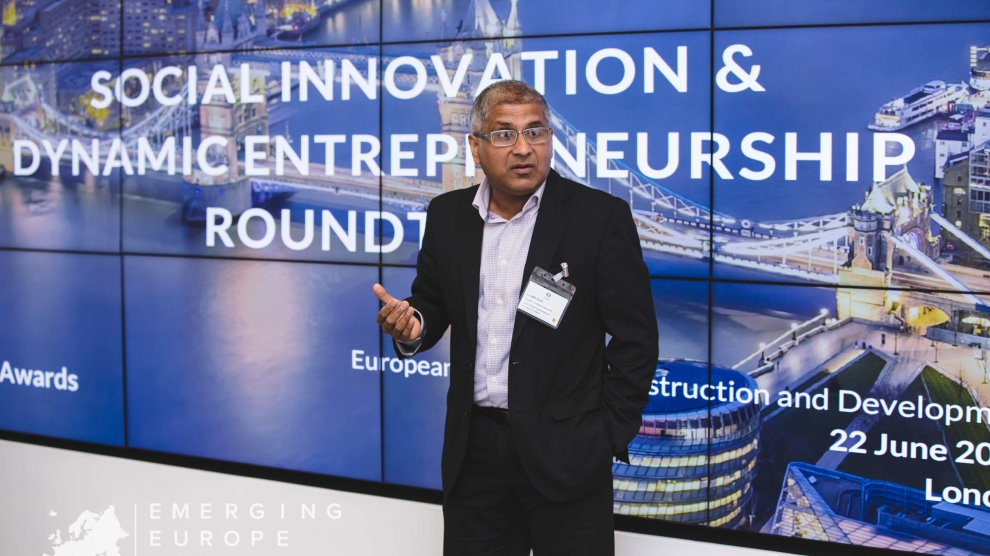Empathy is one of the key skills of a future dynamic entrepreneur. That was one of the key conclusions of a roundtable session dedicated to social innovation and dynamic entrepreneurship held at the inaugural Emerging Europe Awards, which took place on June 22 at the European Bank for Reconstruction and Development (EBRD) in London.
“Dynamic entrepreneurship is the ability to be a small and a big company at the same time,” said Ilona Bicevska, producer at Avantis, a Latvian youth initiative which encourages young people to share their passion, knowledge and opportunities by organising events and creating media content. Or, according to Malgorzata Marek, PwC corporate responsibility team leader for Central and Eastern Europe, it is all about being able to make decisions with heart and not just reason.
But it can be difficult to show empathy and be compassionate with all the technological tools we are used to counting on.
“We shouldn’t fear technology,” said Jaroslav Likhachevskiy, CEO of DeepDee, a Belarusian company specialised in the development of advanced software solutions for the healthcare industry, such as a system for instant early diagnosis of eye diseases. Deepdee was the winner of the Emerging Europe Award for best Social Impact Start-up of the Year 2018.
“Being human is something you cannot learn, but you can work on,” agreed Ana Alibegova, director of Programme Development at the Association for Education Mladiinfo International, a Macedonian non-profit organisation dedicated to helping young people fulfil their educational potential.
“We just launched our first project outside Europe, which also aims to promote our region to foreigners,” she added.
All the roundtable participants agreed that a shift in the educational system is needed as most of the CEE educational models were defined as “old and obsolete.”
“We need to address and follow the real needs of society. We must focus into digital skills,” commented Igor Majer, Siemens head for R&D in Ostrava, Czech Republic. “This is why we are also active in educating and mentoring people.”
PwC is also committed to better educating its employees via continuing evaluation. “We noticed that the skills of people dealing with real problems have improved: they are more open, more creative and able to address the same issue from different perspectives,” said Ms Marek.
“I am proud to be Armenian today: I see that more things are possible in our country and that also our education system is changing in this way,” said Larisa Hovannisian, founder and CEO of Teach for Armenia, the winner of the Emerging Europe Award for the best Young Empowerment Initiative of the Year 2018.
Teach For Armenia is a social impact organisation focused on addressing educational inequality in Armenia by organising passionate people to spend two years teaching in rural communities throughout the country, and strengthening a growing advocacy movement aimed at developing Armenia.
On the other hand, innovation and entrepreneurship is not all about the younger generations. While in the near future central and eastern Europe will face a major demographic challenge caused by rapid population ageing, emerging Europe’s companies look at this issue as an opportunity.
“We must remember that we are ageing. Old generations are those who transfer their ideas into new ones, so they are important as well,” commented Maryia Muntsian, project manager of the Centre of Active Longevity. “Old people are still active everywhere but not in our region. People living in former Soviet countries are more isolated.”
“It is amazing to hear these stories,” said Paula Kennedy Garcia, Convergys’ vice president for EMEA markets and a member of the Emerging Europe Alliance for Business Services, Innovation and Technology’s Steering Committee. “Technology brings people closer. We need to turn tech into as many opportunities as possible.”






[…] “Being human is something you cannot learn, but you can work on,” said Ana Alibegova during the roundtable session dedicated to social innovation on and dynamic entrepreneurship. Find more about the panel here: https://emerging-europe.com/in-brief/lets-not-fear-technology-lets-embrace-it/ […]